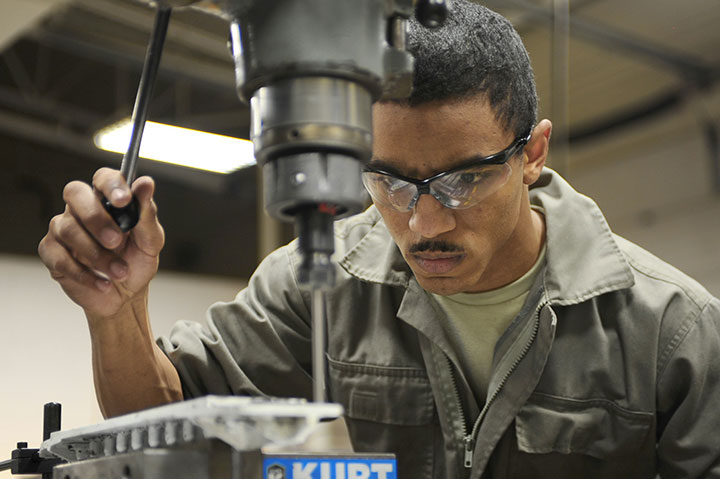From Mining to Manufacturing
27 Sep 2017
A new training program in Eastern Kentucky puts unemployed miners to work running the world’s most advanced computer-assisted industrial machining equipment.
“Hillbillies. Mountain people.” These are stereotypes all-too familiar to Doug Potter, who call Eastern Kentucky home. “People say we talk funny, and we’re not real smart.”
But this former coal worker gives the lie to these stereotypes. Potter is among the first graduates of eKentucky Advanced Manufacturing Institute, a specialized training program designed to increase the existing skills of former coal workers for advanced manufacturing jobs. Trainees learn Computer Numerical Control (CNC) machining—running the highly technical computers that operate lathes, routers, grinders, and other machines that build high-precision parts for the US manufacturing industry.
Today, a skilled, advanced-technology machine operator, Potter combines his understanding of higher algebra and calculus with an innate mechanical aptitude and a work ethic forged in Kentucky’s coal fields. It’s a skill set common to the friends and co-workers he’s met during this 30 years in coal country. “Coal miners,” he says, “are some of the smartest people I’ve ever met.” referring to the highly mechanically inclined nature of this workforce.
A growing number of manufacturing companies have arrived at the same conclusion as Potter. Coal miners leave the industry with a set of skills in high demand within the US manufacturing sector: Engineering, higher math, and mechanical aptitude applied to trades like welding, electronics, hydraulics, and machining.
A recent New York Times article investigating the question of how workers and employers are finding new opportunities to redirect existing skillsets into the workforce cited the success of the eKentucky Advanced Manufacturing Institute's training programs.
“We’ve got 10,000 skilled workers available right now in Eastern Kentucky,” says Chuck Sexton, CEO of One East Kentucky, an economic development organization representing nine counties in the region. “They have a skill set that can be transferred to automotive, aerospace and any number of industries, especially in the metalworking sector.”
End of an Era…
 The bad news, for Doug Potter, came a week before Christmas in 2015. After nearly 30 years in the coal industry, the heavy machine operator was out of a job at 52. “It was pretty rough. It pretty well ruined Christmas,” he says.
The bad news, for Doug Potter, came a week before Christmas in 2015. After nearly 30 years in the coal industry, the heavy machine operator was out of a job at 52. “It was pretty rough. It pretty well ruined Christmas,” he says.
His was hardly an isolated case. Since the early 2000s, Eastern Kentucky has seen its coal employment plummet from about 13,700 jobs to about 3,700, a decline of nearly 73 percent. Statewide, jobs in the coal industry dropped to the lowest in 120 years, according to the Lexington Herald Leader. “Everybody I know and his brother is laid off,” Potter says. “There’s no jobs.”
Environmental regulations that increase the cost of burning coal are partly to blame. But a variety of other factors contributed. Eastern Kentucky’s seams have been mined for a century, and the remaining coal is harder and more expensive to extract. Global demand for coal is down, since natural gas prices have dropped.
As a result, it’s unlikely that President Trump’s roll-back of industry regulations will jumpstart the industry, Ken Troske, Sturgill Professor of Economics at the University of Kentucky told the Herald Leader. “I put the range of possibilities at somewhere to a continuing small decline to a small growth,” Troske says. “We are not going to recover the coal jobs we’ve seen in the state lost in the last decade.”
…and the Beginning of a New Era
Potter’s story represents an alternative path for coal country—re-positioning and certifying the skills of the workforce while building the manufacturing economy. The eKentucky Advanced Manufacturing Institute plays a key role in this new path.
The institute was the brainchild of its director, Kathy Walker, who recognized that strategic training to build on coal workers’ existing skills was a key ingredient in transitioning to a new economy. Walker collaborated with the Gene Haas Foundation, which runs a handful of similar programs, and the Commonwealth of Kentucky to establish a training center in Eastern Kentucky.
But before the Haas Foundation would take a chance on Kentucky, Walker and her colleagues needed to prove that coal miners have what it takes—specifically an aptitude for higher math. Potter, along with a handful of other pioneering students, were the test case for the program. They agreed to participate at another Haas location, even though it would mean coming into the class three weeks behind the other students. They finished at the top of the class.
Ground-breaking advances
The eKentucky Advanced Manufacturing Institute will repurpose a facility in Paintsville, KY with plans to begin teaching on-site this fall. In the meantime, more coal workers have followed in Potter’s footsteps to receive training at the Vincennes University Haas campus. So far, all the graduates have immediately stepped into paying jobs using their new skills.
One East Kentucky’s Chuck Sexton explains that demand for CNC workers is high. “Throughout the United States, companies are having a difficult time finding skilled workers, and CNC machinists is just one of the many,” he says. “Our goal is to promote our available skilled workers, certified industrial parks and location to build a business case for companies to place facilities here.”
For more information visit www.oneeastky.com or contact Mr. Sexton at the One East Kentucky offices.
More Topics


Eastern Kentucky is an AEROreadytm Region
Sep 18 2017

